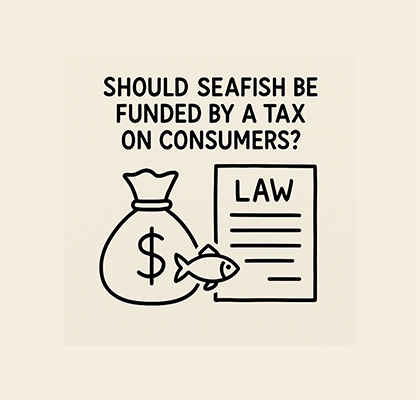SeaFish, the body established to support the UK’s commercial fishing industry, plays an important role. However, there is growing concern about the fairness of its funding model. The SeaFish levy, which is a legal requirement under the Sea Fish (Levy) Regulations 1999, mandates that businesses in the UK fishing industry contribute a percentage of their income. This levy is passed on to consumers through increased seafood prices. Essentially, this means that seafood consumers are funding an organisation that lobbies on behalf of the commercial fishing sector, raising the question: Is it right for SeaFish, a commercial lobbying group, to be funded by a mandatory tax on consumers?
What Does the Levy Fund?
SeaFish’s mission, as outlined on their website, is to support the profitability and competitiveness of the commercial fishing industry. Their work focuses on improving food safety standards, promoting sustainability, and supporting the sector’s development. While these are important objectives, the funding model for SeaFish is concerning. The levy, which is effectively a tax on seafood consumers, increases the cost of seafood without necessarily addressing broader environmental concerns. In some cases, the interests of commercial fishing, as promoted by SeaFish, can be at odds with national policies aimed at restoring habitats and protecting fish stocks.
The Conflict with National Policy on Marine Conservation
One of the primary concerns with SeaFish’s funding model is its potential conflict with government policy on marine conservation. National efforts, such as the Joint Fisheries Statement and other environmental policies, focus on restoring fish habitats and protecting vulnerable fish populations. However, SeaFish’s role in lobbying for the commercial fishing sector often supports short-term economic gains for the industry, which may conflict with the long-term objectives of fish stock protection.
SeaFish’s efforts to promote higher quotas or reduce restrictions on fishing can directly oppose government strategies that aim to protect overexploited stocks. By funding SeaFish through a levy on consumers, the public is effectively contributing to a lobbying group that may not always align with national sustainability goals.
Should a Commercial Lobbying Group Be Tax-Funded?
Given these concerns, it is worth asking whether a commercial lobbying group like SeaFish should continue to be funded by a mandated levy. While SeaFish supports the commercial fishing sector, the financial burden on consumers seems unfair. The levy not only increases the cost of seafood but also contributes to an organisation that is primarily concerned with the commercial fishing industry, rather than broader public or environmental interests.
If SeaFish is to continue receiving funding through a levy, there must be greater transparency in how this money is spent and a more balanced approach that takes into account the broader environmental and societal costs. Funding an organisation that often lobbies against conservation policies raises an ethical dilemma, particularly when consumers bear the financial responsibility.
A More Balanced Approach to Fisheries Management?
Instead of relying on a mandated levy, a more balanced funding model could be considered. While the commercial fishing sector remains vital to the UK economy, it must also support sustainable fishing practices. Organisations like SeaFish should receive funding in a way that reflects both economic and environmental priorities, ensuring that the interests of both industry and conservation are adequately represented.
In conclusion, the question remains whether it is right for SeaFish, as a commercial lobbying body, to be funded by a tax on consumers. Given the potential conflicts with national conservation policies, the time may have come to reassess how we fund and support the fishing sector, ensuring that all stakeholders, from consumers to conservationists, benefit from sustainable marine management.







